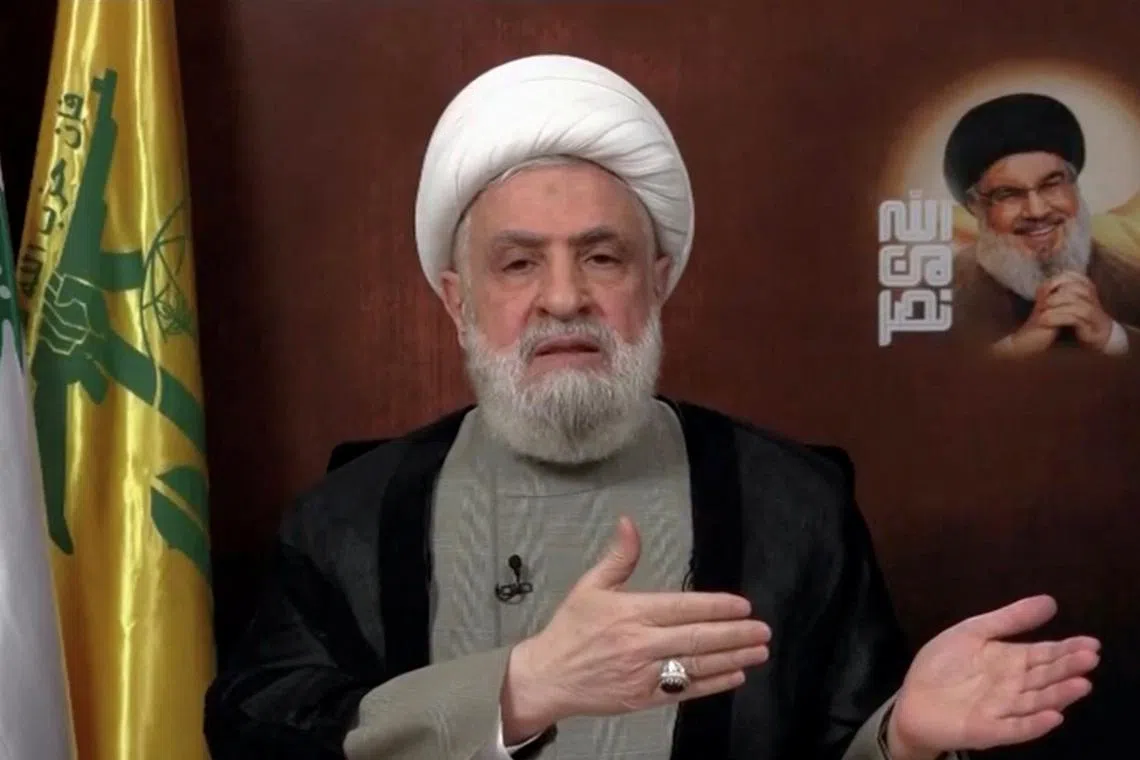Hezbollah warns Lebanon ‘will have no life’ if govt moves against group
Sign up now: Get ST's newsletters delivered to your inbox

Hezbollah leader Naim Qassem threatened to organise street protests in the future if the group's demands were not met.
PHOTO: REUTERS
BEIRUT – Hezbollah chief Naim Qassem on Aug 15 accused Lebanon’s government of “handing” the country to Israel by pushing for the group’s disarmament, warning it would fight to keep its weapons.
Mr Qassem spoke in a televised address after meeting Iran’s top security chief Ali Larijani
Hezbollah raised the spectre of civil war with a warning on Aug 15 there would be “no life” in Lebanon if the government sought to confront or eliminate the Iran-backed group.
The government wants to control arms in line with a US-backed plan following Israel’s military campaign against Hezbollah, which was founded four decades ago with the backing of Tehran’s Revolutionary Guards.
But the group is resisting pressure to disarm, saying that cannot happen until Israel ends its strikes and occupation of a southern strip of Lebanon that had been a Hezbollah stronghold.
“This is our nation together. We live in dignity together, and we build its sovereignty together – or Lebanon will have no life if you stand on the other side and try to confront us and eliminate us,” Mr Qassem said in a televised speech.
Hezbollah emerged badly weakened from last year’s war with Israel, and under US pressure
Israel has dealt Hezbollah heavy blows in the last two years, killing many of its top brass, including former leader Hassan Nasrallah, and 5,000 of its fighters and destroying much of its arsenal.
Lebanon’s Prime Minister Nawaf Salam said that Mr Qassem’s statements carried an implicit threat of civil war, calling them “unacceptable”.
“No party in Lebanon is authorised to bear arms outside the framework of the Lebanese state,” Mr Salam said in a post on X carrying his statements from an interview with the pan-Arab Asharq Al-Awsat newspaper.
The Lebanese Cabinet last week tasked the army with confining weapons only to state security forces, a move that has outraged Hezbollah.
Iran, whose so-called “axis of resistance” includes Hezbollah, has also suffered a series of setbacks, most recently in the war with Israel that saw the US strike its nuclear sites
“The government is implementing an American-Israeli order to end the resistance, even if it leads to civil war and internal strife,” Mr Qassem said.
“The resistance will not surrender its weapons while aggression continues, occupation persists, and we will fight it... if necessary to confront this American-Israeli project no matter the cost,” he said.
He urged the government “not to hand over the country to an insatiable Israeli aggressor or an American tyrant with limitless greed”.
He also said the government would “bear responsibility for any internal explosion and any destruction of Lebanon”, accusing it of “leading the country to ruin”.
Hezbollah and its ally movement Amal would not be organising any street protests at this time, he said, while threatening to do so in future.
However, Mr Qassem said Hezbollah and the Amal movement, its Shi’ite Muslim ally, had decided to delay any street protests while there was still scope for talks.
“There is still room for discussion, for adjustments, and for a political resolution before the situation escalates to a confrontation no one wants,” Mr Qassem said.
“But if it is imposed on us, we are ready, and we have no other choice... At that point, there will be a protest in the street, all across Lebanon, that will reach the American embassy.”
The conflict between Hezbollah and Israel, which left parts of Lebanon in ruins, erupted in October 2023 when the group opened fire at Israeli positions along the southern border in solidarity with its Palestinian ally Hamas at the start of the Gaza war.
Hezbollah and Amal still retain influence politically, appointing Shi’ite ministers to cabinet and holding the Shi’ite seats in parliament. But for the first time in years, they do not hold a “blocking third” of cabinet posts that in the past enabled them to veto government decisions.
Hezbollah retains strong support among the Shi’ite community in Lebanon, but calls for its disarmament across the rest of society have grown.
Before the war with Israel, Hezbollah was believed to be better armed than the Lebanese military.
It long maintained it had to keep its arsenal in order to defend Lebanon from attack, but critics accused it of using its weapons for political leverage.
Iran’s Supreme National Security Council chief Larijani was in Beirut this week, where he met Mr Qassem as well as with President Joseph Aoun.
Iran has expressed its opposition to the government’s disarmament plan, and has vowed to continue to provide support.
Mr Aoun told Mr Larijani that he rejected any interference in the country’s internal affairs, going so far as to brand Iran’s statements on plans to disarm Hezbollah as “unconstructive”. AFP, REUTERS


